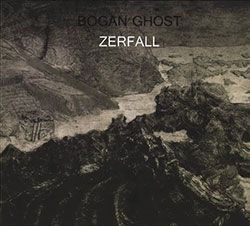
Reflecting the cosmopolitan nature of the city's music scene and its attraction for players from across the globe, Bogan Ghost is a Berlin-based duo of American trumpeter Liz Allbee (confusingly, born in Berlin, Vermont) and Australian cellist Anthea Caddy. Alongside many other activities and collaborations, both are active members of Berlin's Echtzeitmusik scene and its star-studded Splitter Orchester. Bogan Ghost came together in the autumn of 2010; they previously featured on the compilation Echtzeitmusik Berlin (Mikroton, 2012) and issued live downloadable tracks through Audition Records. Zerfall is the duo's first CD release. Quotes from a 2012 interview give telling insights into the pair's approach to their instruments: from Caddy, "I don't completely identify with the term musician or improviser. I come from a media arts based background, so in general my ideas are funnelled through art and then articulated through a piece of wood that happens to be a cello" and from Allbee, "I don't think I ever concretely decided to be an improviser or even a musician. I just started doing it and kept learning by doing it."
Despite the self-effacing nature of those words, Zerfall displays no signs of the happy amateurism that they hint at. Instead, the album is a tightly focused and engaging work that is expertly realized by both players. At its heart are seven tracks studio-recorded in Berlin by fellow Splitter Orchester member Werner Dafeldecker. They are relatively short, with none exceeding six minutes, and two being less than two minutes. Compared to many improvised or eai performances, the brevity of the tracks is a strength, an indication of the pair's focus. Very little time (theirs or ours) is spent waiting for something of substance to emerge; instead, whether by design or skilful editing, each track soon gets to the point and then does not overstay its welcome. If, as with "Pits", it makes its point inside just seventy-five seconds, that is how long it lasts. Then, time to move on...
Those seven tracks are bracketed by two similarly succinct tracks, each of which combines separate recordings made by Allbee and Caddy in different times and locations; so the closing track, "Decay", consists of trumpet and field recordings by Allbee made at Wesleyan University, USA (by the way, Professor Braxton gets a name check in the album credits) combined with cello recordings of Caddy in Australia, the end result being a coherent, eerily atmospheric soundscape, particularly because of the field recordings . Throughout the album, the cello and trumpet perfectly complement and contrast with each other. The album's signature sound is the darkly atmospheric, sustained, low-end drone of Caddy's bowed cello, punctuated and offset by a range of interjections from Allbee. The two work very well together, and seem made for one another. A triumph. More!
Comments and Feedback:
|



